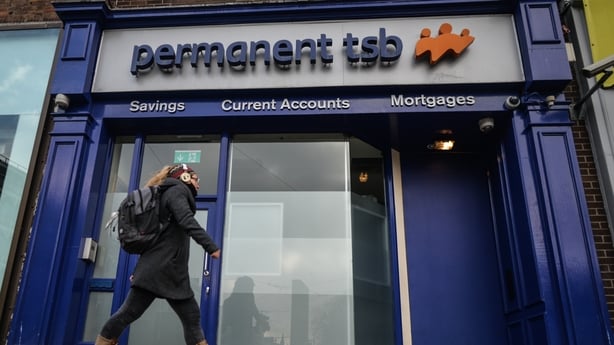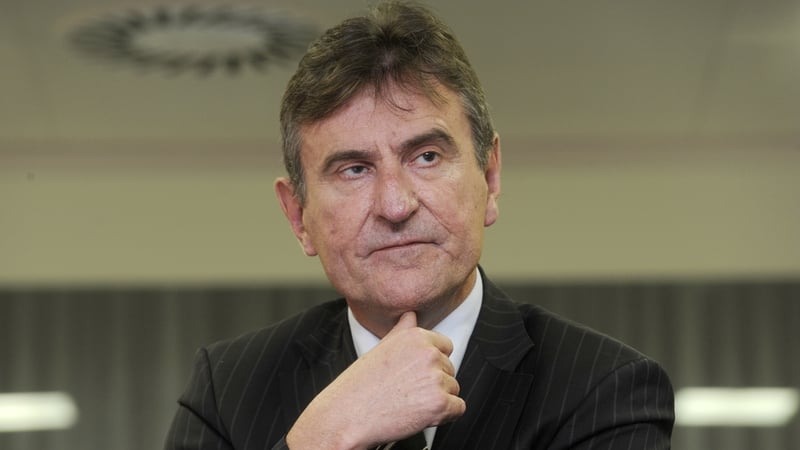A Central Bank inquiry has found that former Permanent TSB chief executive David Guinane participated in regulatory breaches by the bank relating to its treatment of tracker mortgage customers between 2009 and 2010.
Mr Guinane is the first individual to face an inquiry for their role in the tracker mortgage controversy and to be found to have participated in any breaches.
The inquiry is led by sole member Peter Hinchcliffe.
It found that “on the balance of probabilities” between 19 January 2009 and April 2010, Mr Guinane participated in a breach by PTSB of its regulatory obligation by not acting in the best interests of its customers when it dealt with customers who indicated their intention to return to a tracker-rate loan and whose mortgage loan agreements contained a contractual clause to do so.
It said that the bank adopted a process that avoided offering the original tracker rate to which certain customers were entitled, unless the customer queried or complained about the rate they were offered.
It was determined that Mr Guinane’s participation arose as a result of his failure to consider the implications for customers when signing off on a proposal to adopt that process.
The Central Bank found that PTSB treated those customers who did not complain about the tracker rate that was applied after the fixed-rate period, unfairly and contrary to their best interests when compared to those that actually complained.
Mr Guinane worked for PTSB for more than 25 years, and served as chief executive of the bank between 2007 and 2012.

Possible sanctions against him include a caution, a fine of up to €500,000, disqualification from managing a regulated provider, and a direction to pay the inquiry’s costs.
Any sanctions will be determined following today’s inquiry hearing.
Although he found the ex-CEO’s role was instrumental in the breaches, Mr Hinchcliffe said there is “no finding of dishonesty against Mr Guinane”, that he “did not form an intention to harm or take advantage of customers”, and that Mr Guinane was entitled to have received better internal support.
Last year, Mr Guinane’s legal team told the Central Bank inquiry that he felt he was singled out, adding that more than 15 years had passed “since the core matters” that were investigated.
The tracker mortgage controversy is the biggest overcharging controversy in the State’s history, and included all of the major banks.
The Central Bank previously conducted an investigation into it, which found that more than 40,000 customers were affected.
The investigation began in 2015, when the Central Bank ordered lenders to look through their records to identify any customers who had wrongly been moved from or denied tracker mortgages, which follow the ECB main lending rate when it goes up and down.
Lenders have paid out nearly €700m in redress and compensation to affected customers.
Over 2,000 PTSB customers were impacted and the bank paid €21 million to the Central Bank for its role in the controversy.
Following today’s inquiry findings, David Guinane said he was extremely disappointed.
He said: “I have always maintained that I have done nothing wrong. I believe I have been singled out by the Central Bank in respect of events which occurred more than 16 years ago.
“I do not accept the findings and I am advised by my legal team that these findings are fundamentally flawed. I will be exercising my right to appeal at the earliest
opportunity.”
Commenting on the finding, Financial Advisor Padraic Kissane who has represented thousands of affected tracker customers said: “It’s interesting to read that an executive is being held responsible for basically becoming involved in what was the elephant in the room at the time for banks and it brings back into focus some of the cases that I believe strongly have not been addressed and not been corrected, specifically the discounted tracker mortgage product of PTSB.
“Where the bank said no, the Central Bank didn’t pick it up in the investigation that they held, and the Ombudsman ruled against us. I have said consistently it’s one aspect of cases that wasn’t addressed and hasn’t been corrected.
“I don’t believe that the chief executive of the bank only part looked at the tracker matter when in fact these cases of discounted tracker should also be implicated and maybe the Central Bank should take a refreshed look at those cases specifically”




